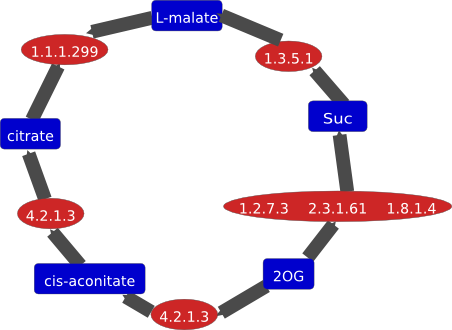EC Number   |
General Information   |
Reference   |
|---|
    2.7.4.14 2.7.4.14 | malfunction |
knockdown of CMPK delays DNA repair during recovery from UV damage in serum-deprived cells but not in the cells without serum deprivation. Exogenous supply of cytidine or deoxycytidine facilitates DNA repair dependent on CMPK in serum-deprived cells. But CMPK knockdown does not affect the steady state level of dCTP in serum-deprived cells. Re-expression of wild-type but not N-terminus deleted CMPK restores the efficiency of DNA repair in CMPK knockdown cells |
737991 |
    2.7.4.14 2.7.4.14 | malfunction |
mutations P64T and R134M as well as downregulation of UMP/CMPK1 expression are observed in SiHaCDV and HeLaCDV, respectively, leading to alterations of cidofovir metabolism and resistance against cidofovir in the cervical tumour cell lines. In HaCaTCDV, no mutations of the uck gene are found and no impairment of UMP/CMPK1 activity is observed |
739215 |
    2.7.4.14 2.7.4.14 | metabolism |
the first and last phosphorylation steps of cytidine 2'-deoxynucleoside analogues are catalyzed, respectively, by deoxycytidine kinase (dCK) and nucleoside diphosphate kinase (NDPK) |
739215 |
    2.7.4.14 2.7.4.14 | more |
analysis of gene expression data associated to nuclear CMPK1 expression, overview |
739700 |
    2.7.4.14 2.7.4.14 | more |
anticancer drugs, analogues of 2'-deoxycytidine (dC) (i.e. lamivudine and emtricitabine) or 2'-deoxycytidine monophosphate (dCMP) (i.e. CDV), require phosphorylation by UMP/CMPK. The anticancer agents cytarabine (araC) and gemcitabine (dFdC) are activated by UMP/CMPK1 following prior conversion to their 5?-monophosphate forms by dCK |
739215 |
    2.7.4.14 2.7.4.14 | more |
the N-terminal region of CMPK is essential for the complex formation and recruitment to DNA damage sites |
737991 |
    2.7.4.14 2.7.4.14 | physiological function |
the cytosolic UMP/CMP kinase 1, is a key enzyme in the activation of antiviral and anticancer drugs and catalyzes the phosphorylation of (d)CMP analogues to their diphosphate forms |
739215 |
    2.7.4.14 2.7.4.14 | physiological function |
the enzyme catalyzes phosphorylation of pyrimidine nucleoside monophosphates, which is essential for de novo biosynthesis of pyrimidines. Nuclear CMPK1 isozyme is indicative of poor prognosis in triple negative breast cancers, TNBC, and its expression may be related to dysregulation of extracellular matrix and cell cycle molecules, clinical significance of CMPK1 in TNBC patients., overview. CMPK1 performs a crucial role in activation of nucleoside analogues used as chemotherapy against human cancers and pathogenic viruses |
739700 |
    2.7.4.14 2.7.4.14 | physiological function |
the enzyme enzyme catalyzes CDP formation in DNA repair, the synthesis of dCDP or CDP determines the rate of repair. The N-terminal 32-amino-acid of enzyme CMPK is required for its recruitment to DNA damage sites in a Tip60-dependent manner, complex of CMPK/RNR/Tip60 and the recruitment to the sites of DNA damage, overview. Site-specific dCDP formation via CMPK provides a means to facilitate DNA repair in serum-deprived cells, analysis of functional contribution of CMPK to dCTP pool and the rate of DNA compared in MCF-7 cells in serum-containing and serum-deprived conditions |
737991 |





